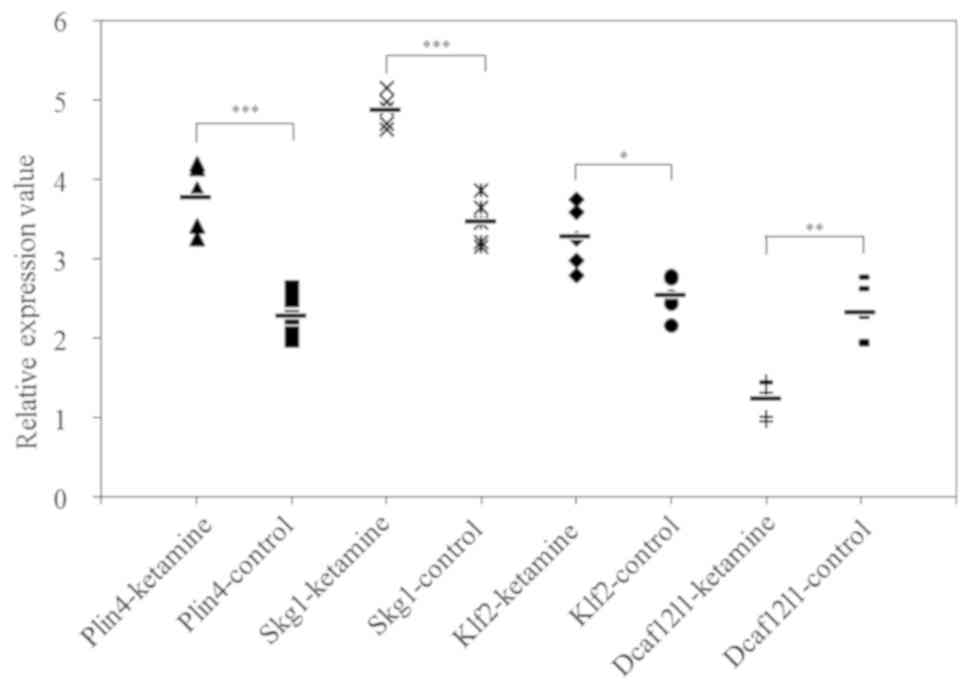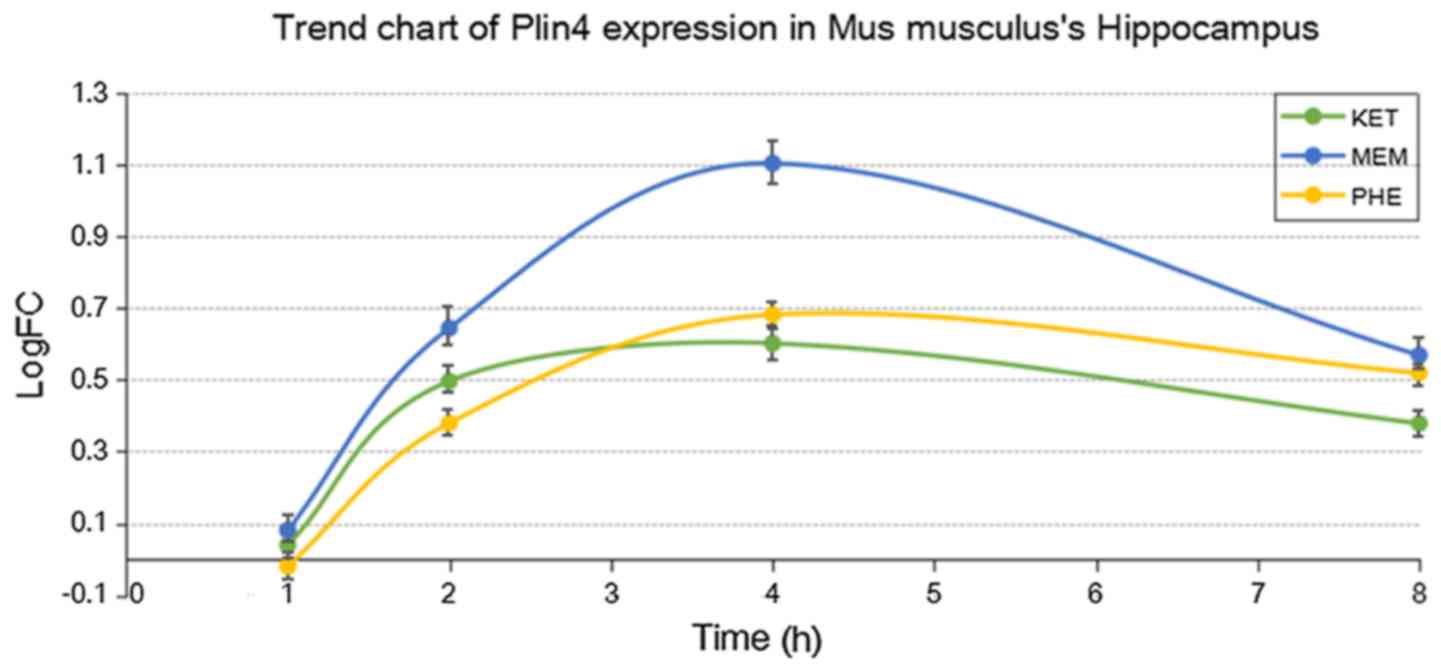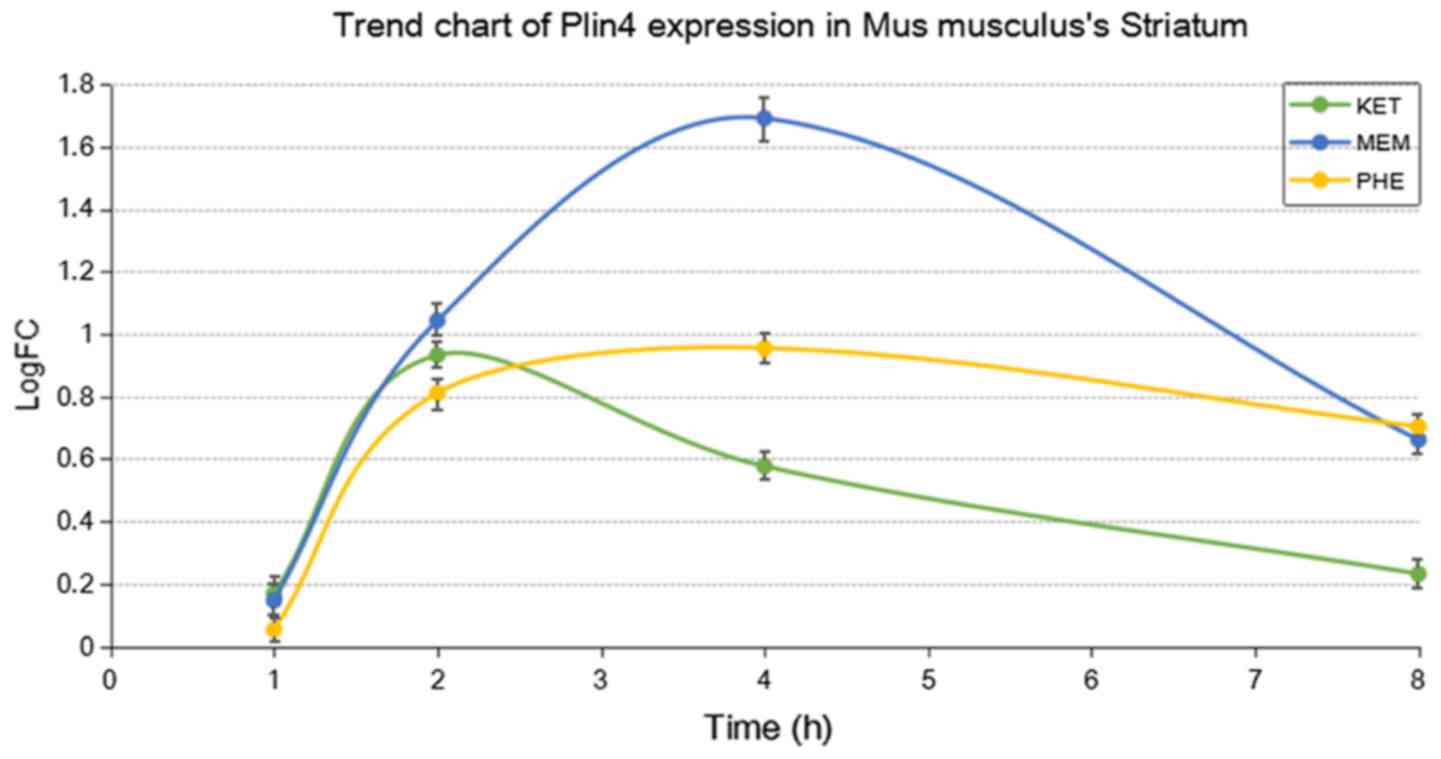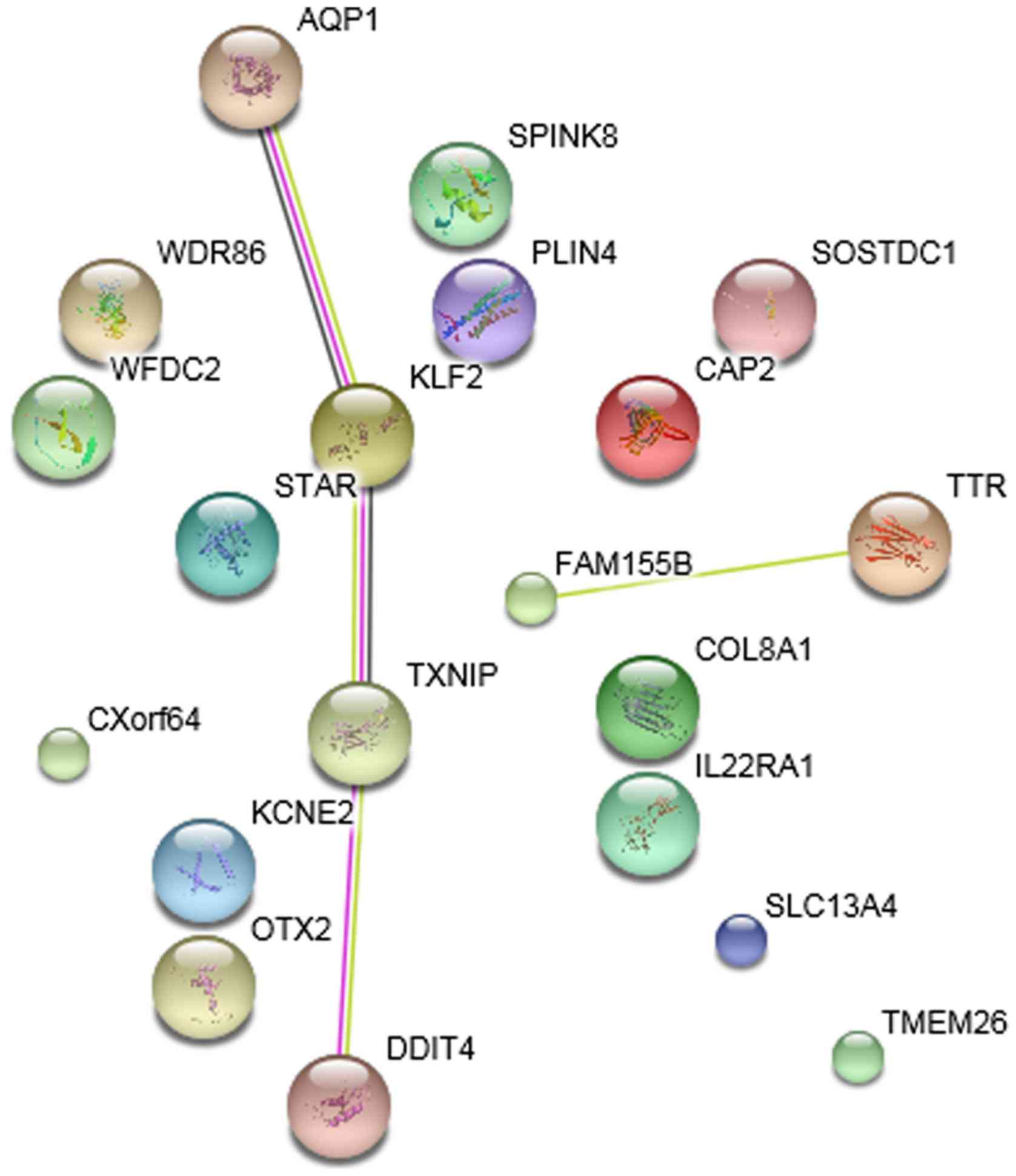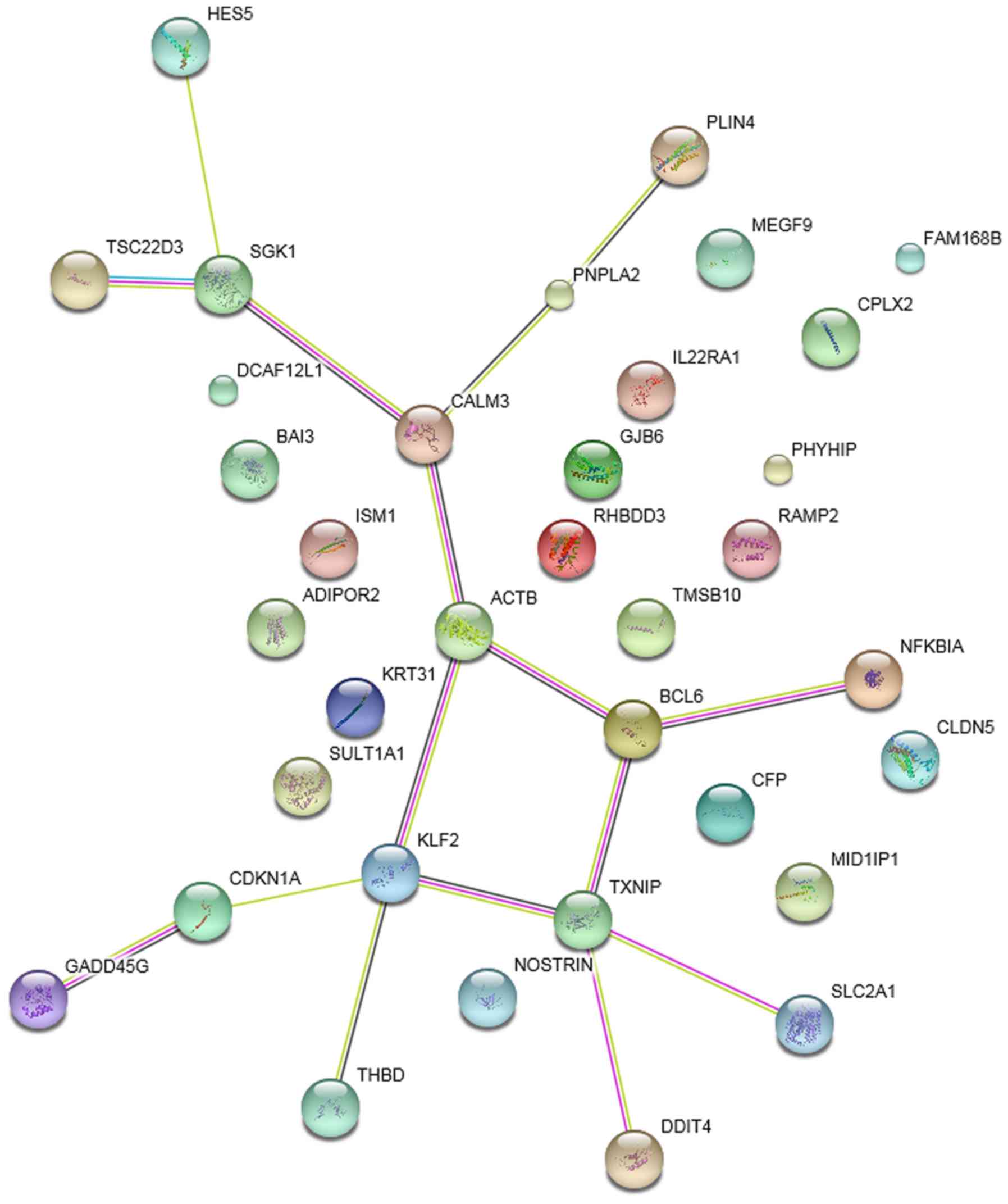|
1
|
Saadat M, Behboodi ZM and Saadat E:
Comparison of depression, anxiety, stress, and related factors
among women and men with human immunodeficiency virus infection. J
Hum Reprod Sci. 8:48–51. 2015. View Article : Google Scholar : PubMed/NCBI
|
|
2
|
HM, Vega WA, Williams DR, Tarraf W, West
BT and Neighbors HW: Depression care in the United States: too
little for too few. Arch Gen Psychiatry. 67:37–46. 2010. View Article : Google Scholar : PubMed/NCBI
|
|
3
|
Krishnan V and Nestler EJ: The molecular
neurobiology of depression. Nature. 455:894–902. 2008. View Article : Google Scholar : PubMed/NCBI
|
|
4
|
Mata DA, Ramos MA, Bansal N, Khan R,
Guille C, Di Angelantonio E and Sen S: Prevalence of depression and
depressive symptoms among resident physicians: A systematic review
and meta-analysis. JAMA. 314:2373–2383. 2015. View Article : Google Scholar : PubMed/NCBI
|
|
5
|
Davey CG, Yücel M and Allen NB: The
emergence of depression in adolescence: Development of the
prefrontal cortex and the representation of reward. Neurosci
Biobehav Rev. 32:1–19. 2008. View Article : Google Scholar : PubMed/NCBI
|
|
6
|
Saravane D, Feve B, Frances Y, Corruble E,
Lancon C, Chanson P, Maison P, Terra JL and Azorin JM; avec le
soutien institutionnel du laboratoire Lilly, : Drawing up
guidelines for the attendance of physical health of patients with
severe mental illness. Encéphale. 35:330–339. 2009.(In French).
View Article : Google Scholar
|
|
7
|
Rogers D and Pies R: General medical with
depression drugs associated. Psychiatry (Edgmont). 5:28–41.
2008.PubMed/NCBI
|
|
8
|
Al-Harbi KS: Treatment-resistant
depression: therapeutic trends, challenges, and future directions.
Patient Prefer Adherence. 6:369–388. 2012. View Article : Google Scholar : PubMed/NCBI
|
|
9
|
Aiyer R, Mehta N, Gungor S and Gulati A: A
systematic review of NMDA receptor antagonists for treatment of
neuropathic pain in clinical practice. Clin J Pain. 34:450–467.
2018.PubMed/NCBI
|
|
10
|
Leung LS and Ma J: Medial septum modulates
hippocampal gamma activity and prepulse inhibition in an,
N-methyl-d-aspartate receptor antagonist model of schizophrenia.
Schizophr Res. 198:36–44. 2018. View Article : Google Scholar : PubMed/NCBI
|
|
11
|
Rasmussen KG: Psychiatric side effects of
ketamine in hospitalized medical patients administered
subanesthetic doses for pain control. Acta Neuropsychiatr.
26:230–233. 2014. View Article : Google Scholar : PubMed/NCBI
|
|
12
|
Ceber M and Salihoglu T: Ketamine may be
the first choice for anesthesia in burn patients. J Burn Care Res.
27:760–762. 2006. View Article : Google Scholar : PubMed/NCBI
|
|
13
|
Heshmati F, Zeinali MB, Noroozinia H,
Abbacivash R and Mahoori A: Use of ketamine in severe status
asthmaticus in intensive care unit. Iran J Allergy Asthma Immunol.
2:175–180. 2003.PubMed/NCBI
|
|
14
|
Maeng S, Zarate CA Jr, Du J, Schloesser
RJ, McCammon J, Chen G and Manji HK: Cellular mechanisms underlying
the antidepressant effects of ketamine: Role of
alpha-amino-3-hydroxy-5-methylisoxazole-4-propionic acid receptors.
Biol Psychiatry. 63:349–352. 2008. View Article : Google Scholar : PubMed/NCBI
|
|
15
|
Murrough JW, Perez AM, Pillemer S, Stern
J, Parides MK, aan het Rot M, Collins KA, Mathew SJ, Charney DS and
Iosifescu DV: Rapid and longer-term antidepressant effects of
repeated ketamine infusions in treatment-resistant major
depression. Biol Psychiatry. 74:250–256. 2013. View Article : Google Scholar : PubMed/NCBI
|
|
16
|
Ardalan M, Rafati AH, Nyengaard JR and
Wegener G: Rapid antidepressant effect of ketamine correlates with
astroglial plasticity in the hippocampus. Br J Pharmacol.
174:483–492. 2017. View Article : Google Scholar : PubMed/NCBI
|
|
17
|
Jing XU: The establishment and evaluation
of chronic unpredictable mild stress depression model. Chin J
Behavioral Med Sci. 12:14–17. 2003.(In Chinese).
|
|
18
|
Wang J, Goffer Y, Xu D, Tukey DS, Shamir
DB, Eberle SE, Zou AH, Blanck TJ and Ziff EB: A single
subanesthetic dose of ketamine relieves depression-like behaviors
induced by neuropathic pain in rats. Anesthesiology. 115:812–821.
2011. View Article : Google Scholar : PubMed/NCBI
|
|
19
|
Livak KJ and Schmittgen TD: Analysis of
relative gene expression data using real-time quantitative PCR and
the 2(-Delta Delta C (T)) method. Methods. 25:402–408. 2001.
View Article : Google Scholar : PubMed/NCBI
|
|
20
|
Meijerink J, Mandigers C, van de Locht L,
Tönnissen E, Goodsaid F and Raemaekers J: A novel method to
compensate for different amplification efficiencies between patient
DNA samples in quantitative Real-Time PCR. J Mol Diagn. 3:55–61.
2001. View Article : Google Scholar : PubMed/NCBI
|
|
21
|
Corrales E, Navarro A, Cuenca P and Campos
D: Candidate gene study reveals DRD1 and DRD2 as putative
interacting risk factors for youth depression. Psychiatry Res.
244:71–77. 2016. View Article : Google Scholar : PubMed/NCBI
|
|
22
|
Lacerda-Pinheiro SF, Pinheiro Junior RF,
Pereira de Lima MA, Lima da Silva CG, Vieira dos Santos Mdo S,
Teixeira Júnior AG, Lima de Oliveira PN, Ribeiro KD, Rolim-Neto ML
and Bianco BA: Are there depression and anxiety genetic markers and
mutations? A systematic review. J Affect Disord. 168:387–398. 2014.
View Article : Google Scholar : PubMed/NCBI
|
|
23
|
Gadow KD, Smith RM and Pinsonneault JK:
Serotonin 2A receptor gene (HTR2A) regulatory variants: Possible
association with severity of depression symptoms in children with
autism spectrum disorder. Cogn Behav Neurol. 27:107–116. 2014.
View Article : Google Scholar : PubMed/NCBI
|
|
24
|
Milanesi E, Bonvicini C, Congiu C,
Bortolomasi M, Gainelli G, Gennarelli M and Minelli A: The role of
GRIK4 gene in treatment-resistant depression. Genet Res (Camb).
97:e142015. View Article : Google Scholar : PubMed/NCBI
|
|
25
|
Wolins NE, Quaynor BK, Skinner JR,
Schoenfish MJ, Tzekov A and Bickel PE: S3-12, Adipophilin, and
TIP47 package lipid in adipocytes. J Biol Chem. 280:19146–19155.
2005. View Article : Google Scholar : PubMed/NCBI
|
|
26
|
Chen W, Chang B, Wu X, Li L, Sleeman M and
Chan L: Inactivation of Plin4 downregulates Plin5 and reduces
cardiac lipid accumulation in mice. Am J Physiol Endocrinol Metab.
304:E770–E779. 2013. View Article : Google Scholar : PubMed/NCBI
|
|
27
|
Peters SJ, Samjoo IA, Devries MC, Stevic
I, Robertshaw HA and Tarnopolsky MA: Perilipin family (PLIN)
proteins in human skeletal muscle: The effect of sex, obesity, and
endurance training. Appl Physiol Nutr Metab. 37:724–735. 2012.
View Article : Google Scholar : PubMed/NCBI
|
|
28
|
Soenen S, Mariman EC, Vogels N, Bouwman
FG, den Hoed M, Brown L and Westerterp-Plantenga MS: Relationship
between perilipin gene polymorphisms and body weight and body
composition during weight loss and weight maintenance. Physiol
Behav. 96:723–728. 2009. View Article : Google Scholar : PubMed/NCBI
|
|
29
|
Schoenebeck B, Bader V, Zhu XR, Schmitz B,
Lübbert H and Stichel CC: Sgk1, a cell survival response in
neurodegenerative diseases. Mol Cell Neurosci. 30:249–264. 2005.
View Article : Google Scholar : PubMed/NCBI
|
|
30
|
Anacker C, Cattaneo A, Musaelyan K,
Zunszain PA, Horowitz M, Molteni R, Luoni A, Calabrese F, Tansey K,
Gennarelli M, et al: Role for the kinase SGK1 in stress,
depression, and glucocorticoid effects on hippocampal neurogenesis.
Proc Natl Acad Sci USA. 110:8708–8713. 2013. View Article : Google Scholar : PubMed/NCBI
|
|
31
|
Pearson R, Fleetwood J, Eaton S, Crossley
M and Bao S: Kruppel-like transcription factors: A functional
family. Int J Biochem Cell Biol. 40:1996–2001. 2008. View Article : Google Scholar : PubMed/NCBI
|
|
32
|
Miller OH, Grabole N, Wells I and Hall J:
Genome-wide translating mRNA analysis following ketamine reveals
novel targets for antidepressant treatment. BioRxiv. 2018.
|
|
33
|
Ramasamy R, Ridgeway A, Lipshultz LI and
Lamb DJ: Integrative DNA methylation and gene expression analysis
identifies discoidin domain receptor 1 association with idiopathic
nonobstructive azoospermia. Fertil Steril. 102:968–973.e3. 2014.
View Article : Google Scholar : PubMed/NCBI
|
|
34
|
Gerovska D and Arauzo-Bravo MJ: Does mouse
embryo primordial germ cell activation start before implantation as
suggested by single-cell transcriptomics dynamics? Mol Hum Reprod.
22:208–225. 2016. View Article : Google Scholar : PubMed/NCBI
|
|
35
|
Duman RS, Li N, Liu RJ, Duric V and
Aghajanian G: Signaling pathways underlying the rapid
antidepressant actions of ketamine. Neuropharmacology. 62:35–41.
2012. View Article : Google Scholar : PubMed/NCBI
|
|
36
|
Li N, Lee B, Liu RJ, Banasr M, Dwyer JM,
Iwata M, Li XY, Aghajanian G and Duman RS: mTOR-dependent synapse
formation underlies the rapid antidepressant effects of NMDA
antagonists. Science. 329:959–964. 2010. View Article : Google Scholar : PubMed/NCBI
|
|
37
|
Ficek J, Zygmunt M, Piechota M, Hoinkis D,
Rodriguez Parkitna J, Przewlocki R and Korostynski M: Molecular
profile of dissociative drug ketamine in relation to its rapid
antidepressant action. BMC Genomics. 17:3622016. View Article : Google Scholar : PubMed/NCBI
|
|
38
|
Farhan M, Wang H, Gaur U, Little PJ, Xu J
and Zheng W: FOXO signaling pathways as therapeutic targets in
cancer. Int J Biol Sci. 13:815–827. 2017. View Article : Google Scholar : PubMed/NCBI
|
|
39
|
Polter A, Yang S, Zmijewska AA, van Groen
T, Paik JH, Depinho RA, Peng SL, Jope RS and Li X: Forkhead box,
class O transcription factors in brain: Regulation and behavioral
manifestation. Biol Psychiatry. 65:150–159. 2009. View Article : Google Scholar : PubMed/NCBI
|
|
40
|
Farhan M, Wang H, Gaur U, Little PJ, Xu J
and Zheng W: FOXO signaling pathways as therapeutic targets in
cancer. Int J Biol Sci. 13:815–827. 2017. View Article : Google Scholar : PubMed/NCBI
|
|
41
|
Huang P, Zhou Z, Shi F, Shao G, Wang R,
Wang J, Wang K and Ding W: Effects of the IGF-1/PTEN/Akt/FoxO
signaling pathway on male reproduction in rats subjected to water
immersion and restraint stress. Mol Med Rep. 14:5116–5124. 2016.
View Article : Google Scholar : PubMed/NCBI
|
|
42
|
Liang B, Moussaif M, Kuan CJ, Gargus JJ
and Sze JY: Serotonin targets the DAF-16/FOXO signaling pathway to
modulate stress responses. Cell Metab. 4:429–440. 2006. View Article : Google Scholar : PubMed/NCBI
|















